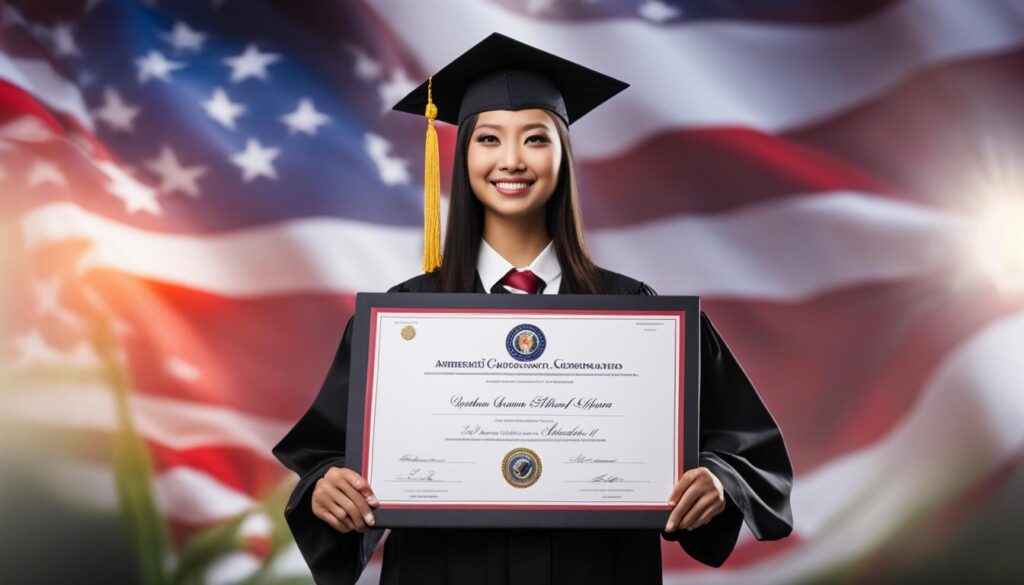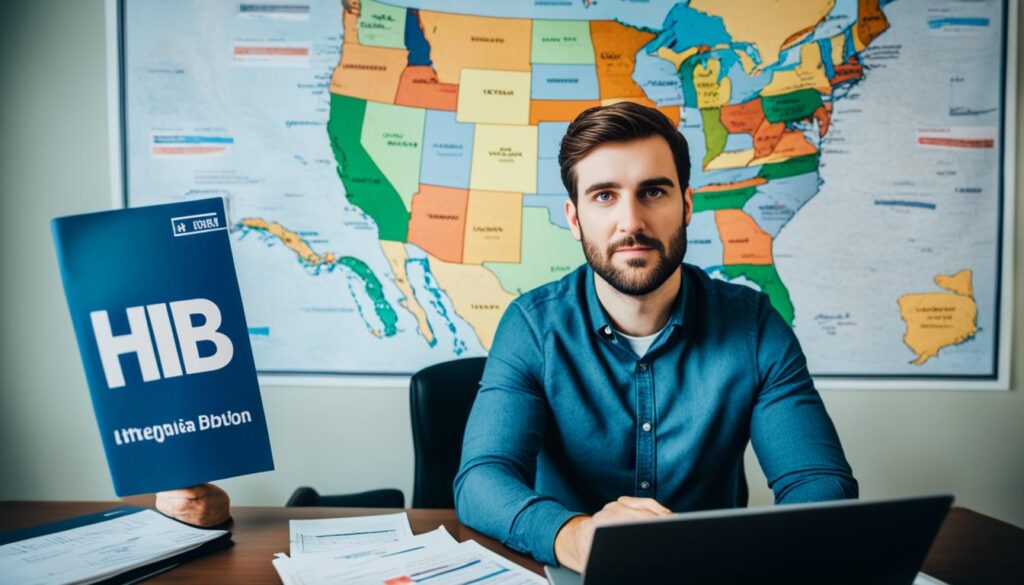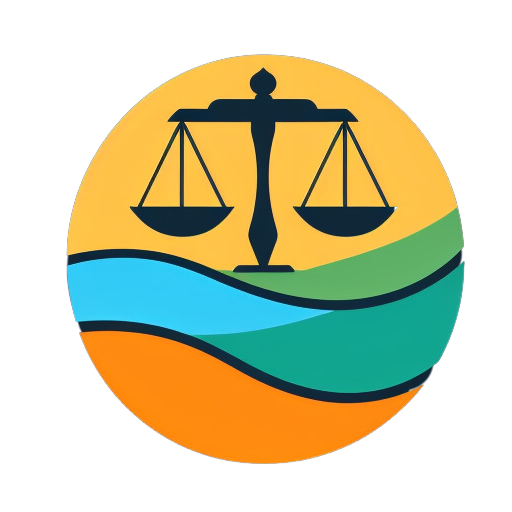The pathway to securing an H-1B Visa application in the bustling city of Los Angeles is a crucial step for Tech Professionals H-1B Visa aspirants who contribute to one of the most innovative regions in the world. A beacon for technology prowess, LA demands the best and brightest, and the H-1B Visa serves as a key to unlocking the potential residing within highly skilled international talent. With this specialized visa, the wealth of opportunities in the tech sector becomes accessible, fostering a dynamic environment where innovation thrives.
This guide aims to demystify the H-1B Visa Process for Tech Professionals in LA, charting a clear route from initial application steps right through to approval. Prospective applicants will find themselves better prepared to navigate the complexities of this process, ensuring that they meet every requirement to take their career to the city where dreams take shape amidst silicon and circuitry.
Understanding the H-1B Visa Classification
Navigating the complexities of the H-1B Visa can be daunting for aspiring professionals. The Visa is partitioned into distinct categories, each with its own set of rigorous qualifications. For those in specialty occupations, particularly in the tech industry, understanding these prerequisites is crucial for a successful application.
Specialty Occupations Requirements
The H-1B specialty occupations entail roles that demand expertise in fields such as Information Technology, Engineering, and Finance. Applicants are expected to possess the following:
- A US bachelor’s degree or its equivalent as a minimum entry for the proposed position.
- Specialized knowledge in a niche area that aligns precisely with the job’s duties.
- Proof that the position ordinarily requires a degree or its equivalent in a related specialty.
These H-1B Visa requirements ensure that the beneficiaries of the program are the best fit for their respective professional roles, maintaining high standards within the industry.
Department of Defense Project Workers and Fashion Models Criteria
For those involved with Department of Defense (DOD) cooperative research and development project work, as well as fashion models of distinguished merit and ability, specific criteria apply:
| DOD Cooperative Research and Development Project Workers | Fashion Models |
|---|---|
| Must have a bachelor’s degree related to the project | Requirement of distinguished merit and ability |
| Details on the nature and duration of the project are necessary | Industry recognition as an authoritative figure in fashion |
| Positions should affirm why specialized knowledge is indispensable for the role | Portfolio demonstrating a substantial track record in modeling |
It is essential for prospective applicants to carefully assess these classifications and determine the right strategy to meet the H-1B Visa requirements.
H-1B Visa Eligibility for Tech Professionals
The quest for an H-1B Visa is an intricate journey, demanding tech professionals not only to demonstrate exceptional skillsets but also to comply with stringent education and licensure prerequisites. For a niche breed of experts yearning to flourish in the tech hubs of the United States, these eligibility requirements serve as the linchpin of their professional trajectory.
Minimum Education Requirements for H-1B Visa
Garnering an H-1B Visa hinges on the attainment of certain educational criteria. Tech professionals are expected to present proof of completing a U.S. bachelor’s or higher degree pertinent to their specialty. Alternatively, showcasing a foreign degree equivalence is also a viable pathway. This reciprocality of credentials signifies that international qualifications must be parallel to a U.S. degree, as validated by an authoritative institution or through credible evaluation services.

License and Certification Necessities
In the tech realm, where innovation reigns, certain roles may necessitate a practitioner to hold a license or certification to legally execute their duties. This stipulation is especially crucial for those roles where the state mandates professional licensure. Hence, an H-1B applicant may need to obtain such licensure prior to the approval of their petition. Businesses offering H-1B Visa sponsorship must be acutely aware of these regulatory frameworks to ensure seamless onboarding of global talent.
An alignment of academic achievements with the technical complexities of the job sets the foundation for H-1B eligibility. Here’s a concise demonstration of the educational benchmarks that potential H-1B candidates and their sponsors should align with:
| Requirement | U.S. Credentials | Equivalent Credentials |
|---|---|---|
| Bachelor’s Degree | Accredited U.S. University | Foreign University with U.S. Equivalence |
| License/Certification | State-specific as applicable | Foreign License with U.S. Equivalence |
| Professional Experience | Work experince in specialty occupation | Documented foreign specialty experience |
For Tech Professionals H-1B Visa aspirants, this elucidates the imperative to furnish corroborative documents that attest to their educational and professional aptitude. A robust compilation of academic transcripts, certificates, and relevant licensure could serve as the bedrock to fortify their H-1B petition.
H-1B Visa Process for Tech Professionals in LA
The journey to secure an H-1B Visa unfolds through an intricate, multi-step pathway that begins with employer preparation and culminates in potential visa issuance for foreign tech talent. As tech professionals in Los Angeles navigate this process, understanding the required procedures and sequential steps is vital. The introduction of the H-1B electronic registration process requires careful attention to ensure compliance and optimize chances for selection in the H-1B visa lottery.
H-1B Visa process step by step clarity helps applicants and their prospective employers to meticulously prepare for each phase. Below is a breakdown of the crucial steps in the H-1B Visa application process:
- Labor Condition Application (LCA): Employers must submit an LCA to the Department of Labor (DOL), seeking certification that they agree to meet certain labor conditions, such as paying prevailing wages and maintaining proper working conditions.
- Electronic Registration: With the 2020 introduction of the H-1B electronic registration process, employers must submit a registration for each prospective employee within the required timeframe, usually in early March.
- I-129 Petition Filing: Upon having a registration selected in the H-1B lottery, the employer is eligible to file Form I-129, Petition for Nonimmigrant Worker, with U.S. Citizenship and Immigration Services (USCIS).
- Consular Processing: Should the petition receive approval, tech professionals outside the U.S. will need to undergo consular processing, including visa application and interview, for entry into the United States.
H-1B Visa process step by step involves meticulous documentation, including proof of the professional’s qualifications, the employer’s ability to pay the offered wage, and details of the job offer in LA. Completing these steps successfully leads to securing the coveted H-1B Visa for tech professionals, allowing them to contribute their specialized skills to Los Angeles’ vibrant tech industry.
To help illustrate the overview of necessary actions and considerations, a table detailing key aspects of the H-1B Visa application process is provided:
| Step | Activity | Responsible Party | Timeframe |
|---|---|---|---|
| 1 | Labor Condition Application (LCA) Submission | Employer | Before H-1B registration window |
| 2 | Electronic Registration | Employer | Announced registration period by USCIS, typically early March |
| 3 | I-129 Petition Filing | Employer | After H-1B registration selection, within 90 days |
| 4 | Consular Processing (if applicable) | Employee | After I-129 petition approval |
This streamlined roadmap is crucial for any tech professional aiming to navigate the complexities of the H-1B Visa process with confidence, aiding them on their path to becoming integral members of Los Angeles’s dynamic tech sector.
The Role of Labor Condition Application in H-1B Visa Petition
As part of the complex journey towards obtaining an H-1B Visa, the Labor Condition Application (LCA) surface as a fundamental requirement that demands rigorous attention from employers and applicants alike. The LCA is not merely a formality but a DOL certified document that establishes a firm ground for the legitimacy and ethical standing of the H-1B visa petition.

Key Attestations and Employer Commitments
Employers commence the H-1B Visa petitioning process by making essential attestations through the LCA. These affirmations are not to be taken lightly as they stand testimony to the employer’s responsibility towards maintaining a fair and competitive labor market:
- Payment of Prevailing Wages: Employers attest to paying the non-immigrant workers at least the prevailing wage level for the occupational classification in the area of intended employment.
- Working Conditions: There is a promise made to offer conditions that will not adversely affect the working conditions of similarly employed U.S. workers.
- No Strike or Lockout: The employer also confirms that there is no ongoing strike, lockout, or work stoppage in the named occupation at the workplace.
- Notice to Workforce: Employers must notify their workforce of their intent to hire H-1B workers, allowing transparency and fairness in hiring practices.
LCA’s Impact on H-1B Visa Approval
The verification of the LCA by the Department of Labor (DOL) significantly influences the outcome of an H-1B visa petition. Successful DOL certification of the LCA reassures the USCIS that the employer is compliant with the legal requirements, thereby paving a smoother path to visa approval. A fully compliant LCA connotes that the employer is committed to:
- Upholding the integrity of the U.S. labor market.
- Supporting the wage standards within the industry.
- Fostering fair competition without undermining U.S. workers.
In conclusion, adherence to the stipulations of the LCA is not merely suggested but required for a successful H-1B visa petition. It is the legal mechanism ensuring the protection of both U.S. and foreign workers’ rights that must be incontestably observed for the acquisition of the H-1B status.
H-1B Visa Application and Approval Timeline
The process of obtaining an H-1B visa involves several critical steps and a clear understanding of the H-1B Visa approval timeline is essential for prospective applicants. Each stage, from filing the H-1B Visa petition to finally receiving approval, is subject to strict deadlines and procedural requirements, particularly when interacting with the USCIS service center. Below is a detailed outline of the H-1B application and approval timeline.
| Phase | Action Required | Approximate Timeline |
|---|---|---|
| 1. Preparation | Employers begin the process by obtaining a Labor Condition Application (LCA) certification. | 1-2 weeks |
| 2. Registration | Submit electronic registration for the H-1B cap (if applicable). | Early March |
| 3. Filing | Filing of Form I-129 petition after registration selection (if applicable). | April 1st to June 30th |
| 4. Processing | USCIS processes the H-1B petition, which can vary based on whether premium processing is selected. | Regular: 3-6 months Premium: 15 calendar days |
| 5. Decision | USCIS makes a decision on the H-1B Visa petition. | Depends on case specifics |
| 6. Notification | Applicants and employers receive notification of the USCIS decision. | 1-2 weeks after decision |
| 7. Consular Processing | For applicants outside the U.S., consular processing and interview scheduling takes place. | 1-3 months after approval |
Note: The above timelines are approximate and can vary depending on individual circumstances and the USCIS service center’s workload. Also, it is crucial for applicants and employers to track the H-1B cap and ensure that electronic registrations are completed within the required timeframe.
Fees Associated with the H-1B Visa Process
Navigating the financial aspects of the H-1B Visa process is critical for applicants to avoid surprises and ensure compliance. Understanding the complexities of USCIS filing costs, potential civil monetary penalties, and additional expenses is a fundamental step in managing one’s budget and expectations when seeking to work in the United States.
Breaking Down the Cost Elements
The primary expenses encountered during the H-1B Visa application encompass a variety of fees mandated by USCIS. H-1B Visa fees include the base filing fee for Form I-129, ACWIA (American Competitiveness and Workforce Improvement Act) training fee, fraud prevention and detection fee, and an optional premium processing fee if expedited service is desired. Applicants must prepare for these compulsory costs as part of their visa journey.
Add-On Expenses During the H-1B Application Journey
Apart from the standard USCIS filing costs, applicants may face additional expenses. These could include fees for legal representation, costs involved in obtaining necessary certifications or licenses pertinent to the specialty occupation, and expenses associated with meeting the obligations under the Labor Condition Application. Employers who fail to comply with H-1B regulations may be subject to civil monetary penalties, which can fluctuate with inflation adjustments, further underscoring the importance of adhering strictly to visa requirements.

Note: Applicants should also anticipate potential outlays for translations, credential evaluations, and travel required for consulate interviews. These indirect costs can add up and should be factored in when budgeting for the H-1B Visa process.
The Importance of H-1B Visa Sponsorship
For technology professionals eyeing opportunities in the United States, H-1B Visa sponsorship is more than a procedural step—it’s a gateway to career advancement. An employer willing to petition for an H-1B Visa on behalf of a candidate plays a pivotal role in the potential for their employment within the specialized and competitive tech industry. Sponsorship is not merely about finding an employer; it’s about finding one who is prepared and qualified to navigate the nuances of immigration law to advocate for a foreign national’s work authorization.
Employer petitions for H-1B denote a commitment to the candidate and adherence to strict regulations governing this nonimmigrant classification. These include but are not limited to employer attestations regarding wage parity, labor conditions, and a genuine need for the specialty occupation which cannot be readily fulfilled by the local workforce. Here, the distinction in wage levels for various roles becomes a crucial factor established by the Department of Labor that employers must comply with to prevent undercutting the local job market.
Securing H-1B Visa sponsorship from a reputable and compliant employer is not just essential—it’s a statutory requirement that can significantly impact the trajectory of a tech professional’s career progression in the U.S.
What often goes understated is the complexity involved for employers in sponsoring an H-1B Visa. It’s a meticulous process that demands rigorous documentation and timing precision to meet filing deadlines, notably the H-1B Visa cap and the annual lottery submissions. Potential sponsors must consider the legal implications of the sponsorship, which is why many engage with immigration attorneys to streamline this process effectively.
- Commitment to Legal Compliance
- Understanding of the Prevailing Wage Levels
- Timely and Accurate Petition Filing
- Adherence to Non-discriminatory Hiring Practices
As we dissect the landscape of H-1B Visa sponsorship, it’s clear that success hinges not only on the qualifications of the visa beneficiaries but also heavily on the capabilities and integrity of the sponsoring entities. A clear grasp of the sponsorship process and obligations distinguishes a seamless entry into the U.S. job market for international tech talents from a disconcerting ordeal fraught with uncertainties.
With the increasing demand for specialized skills in the tech sector, employer petitions for H-1B remain a critical juncture in this intricate ballet of talent mobility. The outcome’s significance reverberates through the economy, accentuating the value of sponsorship in nurturing global competitiveness in a sector driving innovation and growth.
Preparing for the H-1B Visa Interview: A Step-by-Step Guide
Mastering your H-1B visa interview prep is critical to securing your visa. To succeed, one must understand the consulate H-1B interview requirements and be thoroughly equipped with the appropriate documentation and interview strategies. The following guide will arm you with the necessary tools to navigate this final, vital stage of the H-1B visa process.
Documentation Checklist
An exhaustive documentation checklist is your passport to a smooth H-1B visa interview. Ensuring you have all required paperwork will demonstrate organization and seriousness about your U.S. employment opportunity.
| Document | Purpose | Details |
|---|---|---|
| Passport | Identity verification | Valid for six months beyond intended period of stay |
| Visa Application Confirmation (Form DS-160) | Application proof | Confirmation page with barcode and application ID number |
| Appointment Letter | Proof of interview appointment | Printed copy of your interview appointment letter |
| H-1B Petition Receipt Number | Petition tracking | 13-digit alphanumeric code found on petition approval notice |
| Form I-797 | Petition approval | Original or copy of your H-1B petition approval notice |
| Labor Condition Application | Employment conditions | Certified Labor Condition Application filed by your employer |
| Supporting Documents | Qualification proof | Professional transcripts, diplomas, membership of professional institutions |
| Resume/CV | Professional background | Detailed resume/CV outlining your work history and qualifications |
| Letter of Employment | Job offer confirmation | Official offer letter detailing position and terms of employment |
| Evidence of Previous Employment | Experience validation | Letters of reference, pay stubs, job titles, duties, duration, etc. |
Effective Interview Techniques
Your comportment and ability to communicate effectively during your H-1B visa interview can significantly impact the outcome. Below are some strategic interview techniques to help you articulate your purpose and professional value.
- Clarity and Conciseness: Provide clear, concise, and direct responses to questions. Avoid unnecessary details that may lead to confusion.
- Professionalism: Dress professionally and arrive early for your appointment, signaling respect for the interview process.
- Rehearse: Practice common interview questions, focusing on your career path, proposed position, and how it fits within your long-term goals.
- Knowledge of Role and Company: Demonstrate a strong understanding of the job you have been offered and insights into the company’s operations in the U.S.
- Honesty: Always provide truthful information. Misrepresentation can lead to visa denial and future ineligibility.

H-1B Visa Renewal and Extension Considerations
When the time comes for H-1B visa holders to renew or extend their stay in the United States, understanding the nuances of the process is paramount for a smooth transition without jeopardizing their legal status. Although renewals and extensions are common, they are tied closely to **USCIS extension procedures** and specific **H-1B extension eligibility** criteria.
Eligibility for H-1B Extension Beyond Six Years
To obtain an **H-1B Visa renewal** beyond the standard six years, applicants must meet certain conditions. Those who are on the path to lawful permanent residency may have options to extend their H-1B status beyond this period if they have a labor certification or an I-140 immigrant petition filed at least one year prior to the six-year limit.
Maintaining Status During the Renewal Process
Maintaining lawful status throughout the visa extension process is a legal must for H-1B professionals. It involves strict adherence to USCIS regulations and timely submission of renewal applications. Understanding the meticulous **USCIS extension procedures** is crucial to avoid status lapses which could lead to unauthorized periods of stay, potentially impacting future immigration benefits.
| Requirement | Description | Action Steps |
|---|---|---|
| Labor Certification | Must be pending or approved for over 365 days | Check dates and ensure timely filing |
| Immigrant Petition | I-140 petition to be approved or pending for 365 days | Monitor petition status with USCIS |
| Application Timing | File extension request before current H-1B expires | Plan and prepare documents early |
Adhering to these requirements is essential in avoiding any hiccups during the renewal period. Being proactive, staying informed of the evolving immigration laws, and possibly consulting with immigration professionals could greatly contribute to a positive outcome for H-1B visa holders seeking to continue their career pursuits in the United States.
Conclusion
The journey towards acquiring an H-1B Visa for Tech Professionals in LA is one marked with meticulous attention to detail and a deep understanding of the process at hand. The pathway requires not only recognition of the unique classification requirements and eligibility criteria that apply to highly skilled technology workers but also a comprehensive comprehension of each procedural step towards visa attainment. It is imperative for applicants to navigate the complexities of the sponsorship process, aligning themselves with employers who are willing to undertake the commitment required to facilitate this essential element of visa issuance.
Furthermore, the success of completing the H-1B Visa process hinges on timely preparation and submission of necessary documentation, acknowledgment of the fiscal responsibilities attached, and an awareness of the various timelines that can influence the application outcome. Potential fees associated can range broadly and must be factored into the overall budget for any individual aiming to secure their professional position within the robust tech industry of Los Angeles.
Lastly, securing the H-1B Visa is merely the initial phase, as holders must also be versed in the nuances of renewal and extension opportunities. Understanding these provisions ensures long-term compliance and stability within the tech sector of the United States. This informative guide serves as a vital resource, aiming to equip LA tech professionals with the knowledge and strategy required to navigate their H-1B Visa experiences successfully.
FAQ
Q: What are the educational requirements for obtaining an H-1B Visa in a specialty occupation?
A: To be eligible for an H-1B Visa in a specialty occupation, you must have at least a U.S. bachelor’s or higher degree, or its foreign equivalent, related to the specialty occupation from an accredited institution, or hold an unrestricted state license, registration, or certification which authorizes you to fully practice the specialty occupation and be engaged in that specialty in the state of intended employment.
Q: How does a tech professional in LA begin the H-1B Visa application process?
A: The process starts with obtaining a Labor Condition Application (LCA) certification from the Department of Labor (DOL), followed by the employer filing Form I-129, Petition for a Nonimmigrant Worker, with the U.S. Citizenship and Immigration Services (USCIS). Additionally, since 2020, an electronic registration process for H-1B cap-subject petitions is required.
Q: What are the key attestations an employer must make in the Labor Condition Application?
A: Employers must attest to four key commitments in the LCA: they will pay the beneficiary a wage which is no less than the wage paid to similarly qualified workers or, if greater, the prevailing wage for your position in the geographic area of intended employment; the employment of the H-1B worker will not adversely affect the working conditions of workers similarly employed; when the LCA is filed, there is no strike or lockout at the employer’s place of business; and that the employer has notified the workforce about the intention to hire an H-1B worker.
Q: How long does it typically take for an H-1B Visa to be approved?
A: The approval timeline for an H-1B Visa varies. After the LCA is certified and the I-129 petition is submitted, processing by USCIS can take several months. Premium processing services can expedite this, resulting in a response within 15 days of the I-129 petition for an additional fee.
Q: What fees are associated with the H-1B Visa application?
A: The fees for an H-1B Visa application include a base filing fee for the I-129 petition, a fraud prevention and detection fee, an American Competitiveness and Workforce Improvement Act (ACWIA) fee, and potentially a public law fee if applicable. Applicants may also incur additional fees for premium processing, if chosen, and visa issuance fees which vary by country.
Q: Is an employer sponsorship required for an H-1B Visa?
A: Yes, to apply for an H-1B Visa, tech professionals need to be sponsored by an employer who is willing to file a petition on their behalf. The employer must also meet the conditions stipulated by the USCIS, including the ability to pay the prevailing wage and a genuine need for the tech professional’s specialty occupation.
Q: What documents are needed for the H-1B Visa interview?
A: Tech professionals should prepare a comprehensive documentation package for the H-1B Visa interview. This includes a current passport, the approved I-129 petition, the Department of Labor certified LCA, offer of employment from the sponsoring employer, academic credentials, and any prior immigration documents if applicable.
Q: What are the considerations for H-1B Visa renewal and extensions?
A: H-1B Visa holders can generally be admitted for up to three years, with the possibility of extensions up to six years. Under certain circumstances, such as a pending Green Card application (labor certification or immigrant petition), they may be eligible for an extension beyond the six-year limit. Maintaining lawful status through timely renewals and following USCIS procedures are crucial for a smooth H-1B Visa extension process.
Q: How do tech professionals in LA qualify for H-1B specialty occupations?
A: Tech professionals qualify for H-1B specialty occupations by showcasing a body of specialized knowledge typically achieved through attaining a bachelor’s degree or higher in the specific field. The job must match the professional’s field of study and be so complex or unique that it can only be performed by an individual with that degree.
Q: Can H-1B Visa holders switch employers?
A: Yes, H-1B Visa holders can switch employers, but the new employer must file a new H-1B petition on behalf of the visa holder. The individual must remain in lawful status and may not start working for the new employer until the USCIS approves the new petition.

